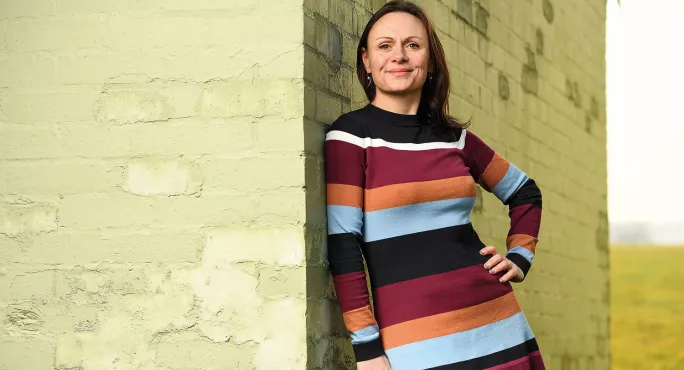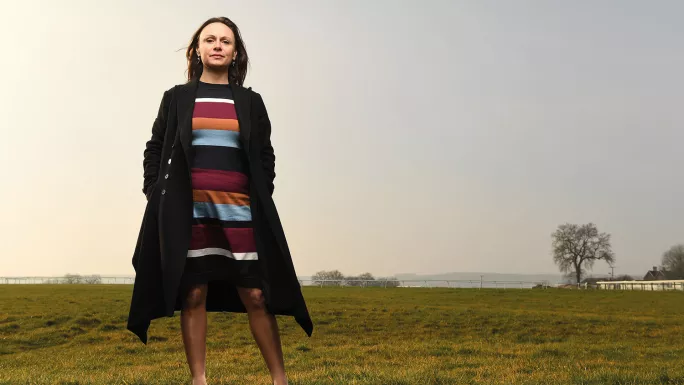- Home
- Tes talks to... Nancy Doyle
Tes talks to... Nancy Doyle

We’re assessing children with special educational needs and disability (SEND) the wrong way. And not only is that bad for educational outcomes, it’s damaging in the long term, too: for careers, for relationships, even for personal happiness.
This is the view of Nancy Doyle, the psychologist who fronted the recent BBC series Employable Me. She’s spent years helping people with neurodiversity fulfil their potential and gain employment, through her social enterprise, Genius Within. But Doyle thinks a lot of the challenges facing those she works with have their roots in the education system.
“We need to broaden what we value,” she says. “Not only are we destroying the confidence of children who can’t do numeracy and literacy well, we’re also creating a generation who don’t realise how their skills might be relevant.”
Her view is that traditional SEND assessments need a radical overhaul, so that they become “positive assessments”.
“The idea of positive assessments came after learning in my early career that what we’re doing when we diagnose someone with dyspraxia or ADHD (attention deficit hyperactivity disorder), or a whole host of conditions, is putting all of our - and their - attention on what they can’t do. And because I work with adults, I’m acutely aware of the long-term damage that does to psyches.”

Doyle references the complex “psychobabble” that many such diagnosis reports use, and points out that details about what an individual might do well are often hidden or are made difficult to understand.
“I’ve done many coaching sessions where someone has showed me their special needs assessment and because I’m a psychologist I can decipher things from it that they can’t,” she says. “I’ve read the information hidden away in the appendix, for instance, and been able to say ‘Oh, your visual-spatial IQ is amazing!’ and people genuinely have no idea. They’ve never been told what they’re actually good at.”
Positive assessments are designed to address this issue, to ensure that diagnostics give a balanced view. “It needs to be a case of the glass half full, not half empty,” says Doyle.
The first step is to give equal weight to what a student can and cannot do. Then the second step is to ensure the language of assessments is accessible to all.
“It’s vital that the descriptions we give to people make sense,” she says. “One way to do this with adults is to talk about skills in the context of jobs, for example, to say ‘this skill might help you with cutting hair’ or ‘this means you have a great understanding of how things are put together’. Whereas for children you might say ‘Hey, you’re great at visual spatial reasoning. That will help you with design technology and science.’ So it’s talking to people in a language they can understand.”
The third major change needed is that reports should be written not for assessors, but for teachers. Doyle says that we are asking teachers to formulate a support plan for a student based on a document written in such a way that most teachers will struggle to understand what challenges the student has and how a teacher might help overcome them. In addition, she feels the assessments focus on only a narrow range of skills - skills children are often already acutely aware are an issue.
“So with positive assessment, we also test things that don’t get tested in the school system, like visual skills, spatial reasoning skills. They’re intrinsic in lots of subjects at key stage 3 and KS4, but lower down, kids who are brilliant with Lego, for example, get lost and therefore don’t develop confidence.”
‘They believe they have no skills’
For evidence of how damaging non-positive assessment can be, she points to some of the candidates in the Employable Me series.
“Brett from series one is a good example - his issue wasn’t autism, but trauma,” she says. “And an education system that kept telling him he couldn’t do anything made it worse. His IQ was huge, but he kept being put in the wrong situations, forced to interact with loud, noisy places. We need to catch the Bretts of this world because he left school with hardly any GCSEs.”
Doyle has countless examples like this. “They end up thinking they can’t do anything,” she says. “They literally believe they have no skills. This has been my line of work for 20 years and I still feel so frustrated because of all the people we see who feel this way in adulthood. And often, it’s for the want of really small changes.”
So what effect would a positive assessment process have?
“One of the first positive assessments I ever did was with a 19-year-old in prison,” says Doyle. “He was cowering, terrified to meet another psychologist who was going to tell him how useless he was. I asked about hopes and dreams, and he said all he wanted out of life was to work with his brothers in their paving business, but he couldn’t because he wasn’t as clever as them.”
By testing him in areas relevant to this, such as block design, Doyle was able to point out the ways in which his perception was false.
“He left a different person. His case worker actually asked, ‘What did you do?’ I just said I told him what he was capable of. It’s lighting a little spark of hope instead of a spark of learned helplessness,” she says.
Schools have started to embrace the approach, but she says this has often been for completely the wrong reasons: Doyle has been asked by headteachers to carry out positive assessments for Year 6 children likely to fail their SATs, “to pre-empt the devastation that was going to cause them”.
All the same, the effect on the child was substantial. She recalls one particular pupil who was revealed to have a visual-spatial IQ in the top 1 per cent. “His father hugged me in the playground and cried,” says Doyle. “He’d always known this child, who took his bike to bits and rebuilt it when he was 7, was bright - but traditional testing just wasn’t showing it.”
She recounts another circumstance in which a positive assessment gave parents the confidence to go out and push for a formal diagnosis - and crucially the right support - for their child. “And this is what I want - for positive assessment to inspire and empower teachers and parents,” says Doyle.
However, she adds that this is only half the battle: changing the way the system works is equally important.
“We need people like that little boy with his bike - people who can build things, design things, fix things,” she says. “But in the primary system, if you’re not good at reading and writing and you can’t sit quietly, you’re going to struggle with the curriculum. Positive assessment can reignite the flame to get people through this and understand that in the world of work, these skills will be valued. It’s about hope versus hopelessness.”
For the same reason, she would make a change higher up the education system, too.
“If I could, I would take the standard literacy component out of apprenticeships. There’s this idea that you can’t be a plumber or hairdresser or electrician without six months of GCSE-standard literacy. It’s nonsense,” she says. “Of course, literacy and numeracy are vitally important, but more and more, technology is changing things and we really need to start placing more emphasis on other subjects, too. We have an education system fit for the 20th century and the 21st century is much more reliant on people who can create. But it’s still the case that what we measure is what people value. And this makes schools less inclusive.”
Positive assessment, Doyle believes, is one effective step towards changing this emphasis. “It’s a positive disruption I want to bring,” she says. “I want reports that are balanced, accessible and quick to be turned around. I think everyone should be doing it the way we’re doing it.”
Kate Townshend is a teacher in Gloucestershire. She tweets @_KateTownshend
Keep reading for just £1 per month
You've reached your limit of free articles this month. Subscribe for £1 per month for three months and get:
- Unlimited access to all Tes magazine content
- Exclusive subscriber-only stories
- Award-winning email newsletters



